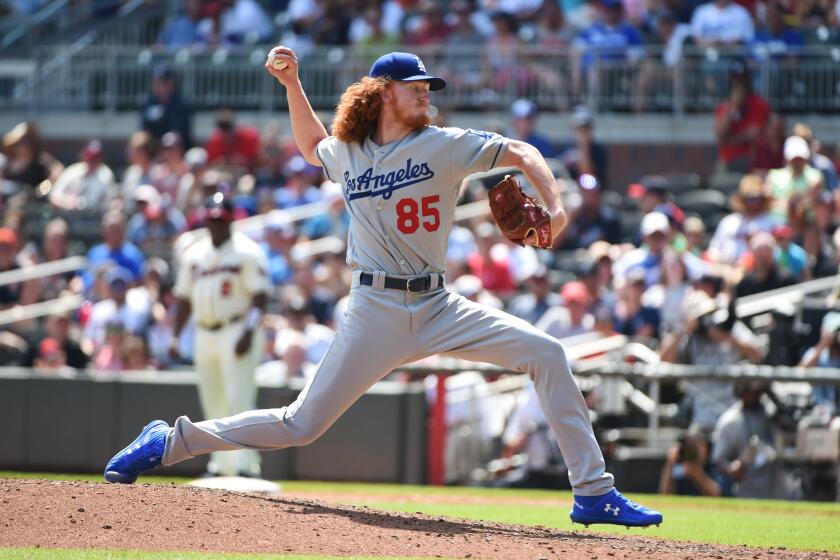Who is Gavin Lux, the Dodgers prospect deemed untouchable at the trade deadline?
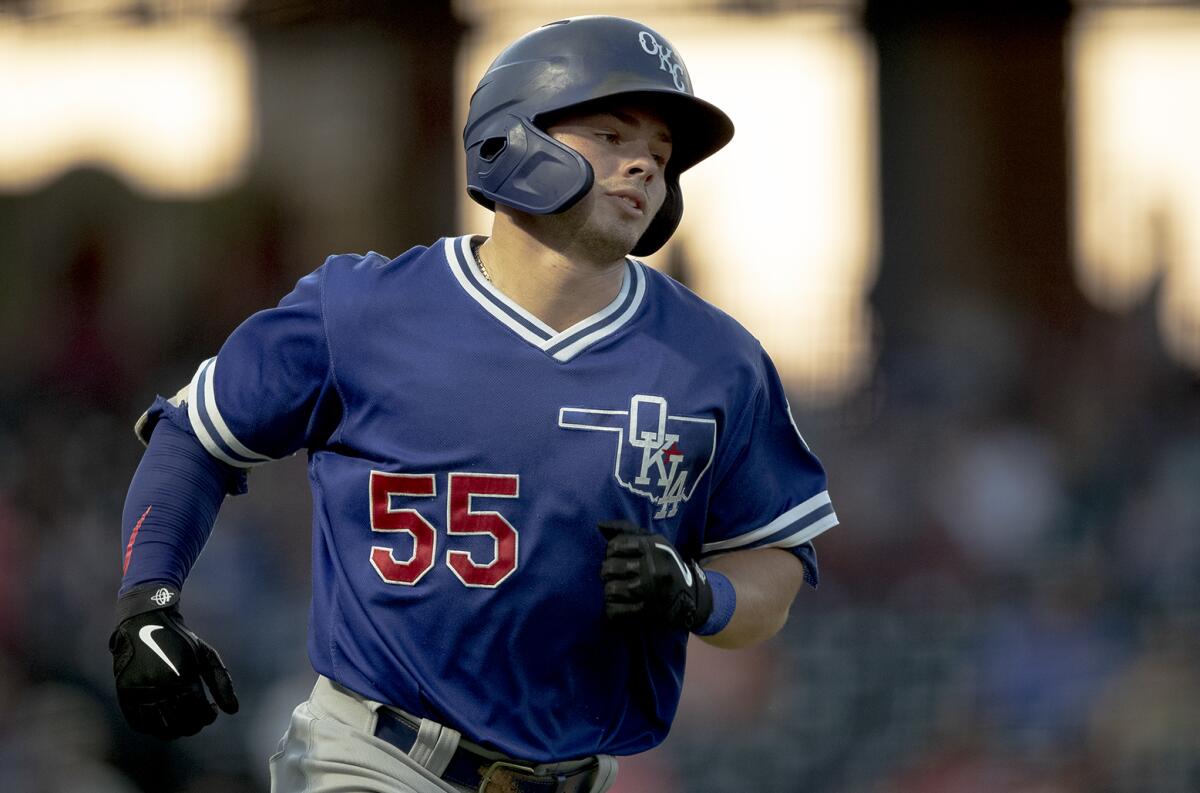
- Share via
OKLAHOMA CITY — The young man the Dodgers refused to trade pulled up to the home clubhouse at Chickasaw Bricktown Ballpark last Monday riding a Lime scooter. He parked it in the hallway and reported to work. It was 4½ hours before Gavin Lux would return to the field for the Oklahoma City Dodgers after a rare day off. He was back to continue setting the Pacific Coast League ablaze.
A reminder of his previous game off hung on a wall inside the clubhouse, near where the team’s lineup is posted. It’s a fake check, blown up on computer paper, payable from Lux to manager Travis Barbary for $1,000. It’s dated July 26 with the memo: Day off tomorrow vs. 100 mph LHP.
Lux, of course, didn’t bribe Barbary to avoid facing a flame-throwing St. Louis Cardinals prospect named Genesis Cabrera. Even springy 21-year-old legs need the occasional break from the minor league slog. But that reality is disregarded when it’s time to roast the hotshot prospect, so Shane Peterson, a 31-year-old Oklahoma City infielder, fabricated the hoax.
“I tried to cash it, and it didn’t work,” Barbary said, “so I just put it up on the board.”
Lux, a left-handed-hitting middle infielder, is the youngest and best player in the clubhouse. He is a captivating talent riding a meteoric rise fitting in with his older teammates as much as he’s standing out on the field since making his triple-A debut June 27.
Pitching in relief of Tony Gonsolin, Dustin May gave up a grand slam to Rafael Ortega and the Atlanta Braves rallied to beat the Los Angeles Dodgers 5-3.
He spent the next month razing the opposition, amplifying the hype surrounding him with each performance while impressing peers with his behind-the-scenes work ethic. By July 31, Lux was batting .465 with eight home runs, four triples and 12 doubles. His on-base-plus-slugging percentage was a bloated 1.443. He recorded a hit in 23 of his 24 games, reached base in all 24 and cemented his status as one of baseball’s premier prospects with a dose of subtle swagger.
“He could be something really special,” said Dodgers outfielder Kyle Garlick, who was with Oklahoma City for Lux’s first seven weeks with the club. “Not just like an everyday big leaguer, but possibly an All-Star. I mean, a Hall of Famer. I don’t know. We’re getting ahead of ourselves here, but I think that’s something you can see right now that’s evident.”
Other organizations saw that too, so when the Dodgers scoured the trade market for a shutdown reliever to strengthen the back end of their bullpen — and obtain perhaps the final piece to a championship club — they found teams demanding Lux. Speculation whirled as the July 31 deadline approached, but the Dodgers didn’t budge. The deadline passed at 1 p.m. Pacific time, and the Dodgers emerged without a premier pitcher.
Lux heard all the rumors. He read the tweets and watched the TV segments. Teammates playfully teased him. It was surreal, it was stressful, and it was a stark reversal from where Lux found himself just a few months earlier in spring training, when the yips plagued his throwing during his first major league camp.
Now, after overcoming failures, he is on the cusp of the major leagues, where grand expectations, buoyed by the Dodgers’ insistence on keeping him, await in Los Angeles.

“I think you use it as a little bit of motivation,” Lux said. “But I don’t really see it as pressure. I’m kind of a low-key guy where pressure doesn’t really affect me like it used to. So I’m just going to go out and play and do my thing, and I’m not going worry about anything else.”
::
Augie Schmidt’s nephew wouldn’t admit it, but he was nervous. There’s no other reason Lux would’ve called Schmidt four times from his hotel room in Salt Lake City the day of the trade deadline. They communicate every day, but four calls? That was unusual.
“I mean, he’s 21,” Schimdt said. “He loves the Dodgers. He dreams about playing in L.A. And for that day to come like that and for it to really hit the fan where it sounded like it was kind of a Lux-or-nothing type of deal, how can he not be a little nervous about it?”
Schmidt knows what it’s like to be a target of major league clubs at that age. The Toronto Blue Jays selected Schmidt, a shortstop, second overall in the 1982 draft out of the University of New Orleans weeks before his 21st birthday. Shawon Dunston went first. Dwight Gooden was picked fifth. Schmidt topped out in triple A. His professional career concluded at 25.
“I couldn’t deal with the failure,” Schmidt said. “I got blindsided.”
When it was over, Schmidt earned his degree and became the baseball coach at Division III Carthage College in his hometown of Kenosha, Wis. He thought he would coach there for a year or two. That was 32 years and 935 victories ago. Along the way, he guided his eager nephew. Lux started consistently working with Schmidt by age 6. He hung around Schmidt’s teams — usually among the best of Midwest small colleges — and laid a foundation far from baseball’s hotbeds.
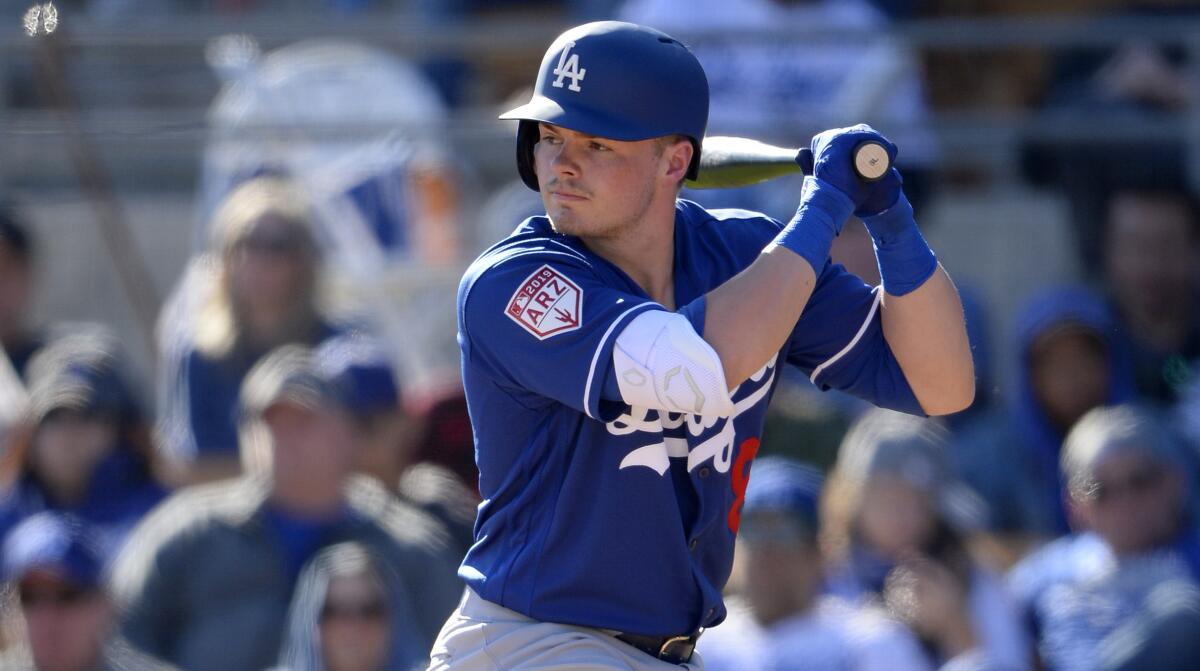
Lux was headed to Arizona State before his trajectory changed during his senior season of high school in 2016. He filled out and, over the course of six months, had major league scouts flooding Kenosha. Schmidt threw batting practice to him at Carthage during lunch on game days, and 30 officials, representing every club, descended. That June, the Dodgers drafted Lux 20th overall.
It was the first of three leaps that have defined Lux’s career. The next one happened during the winter after the 2017 season, his first full professional campaign. He started the year three for 28 at Class-A Great Lakes. It took him a month to record an extra-base hit. Lux heard the word bust thrown around.
“He had the worst year of his career in the minor leagues,” said Jeremy Rodriguez, Lux’s manager with Great Lakes. “But his work ethic, his attitude, just the way he was as a teammate, was like he was hitting .400.”
Dodgers hitting coach Robert Van Scoyoc, then a consultant for the organization, visited Lux early in the season. They worked on keeping Lux’s bat in the strike zone longer with more loft. Lux emerged better, but the mechanics consumed him. He was batting .212 through July. He finished stronger, but it was a disappointment overall. So Lux went to work that offseason with Van Scoyoc, other Dodgers personnel and his uncle on implementing the changes.
“It was kind of my first time trying to deal with failure,” Lux said.
Schmidt’s experiences informed Lux. He confronted the challenge and turned the corner. The result was a combined .324 batting average and .913 OPS with single-A Rancho Cucamonga and double-A Tulsa in 2018. He smacked 15 home runs — eight more than in 2017. He was named the Dodgers’ minor league player of the year. He crept onto top-100 prospect lists.
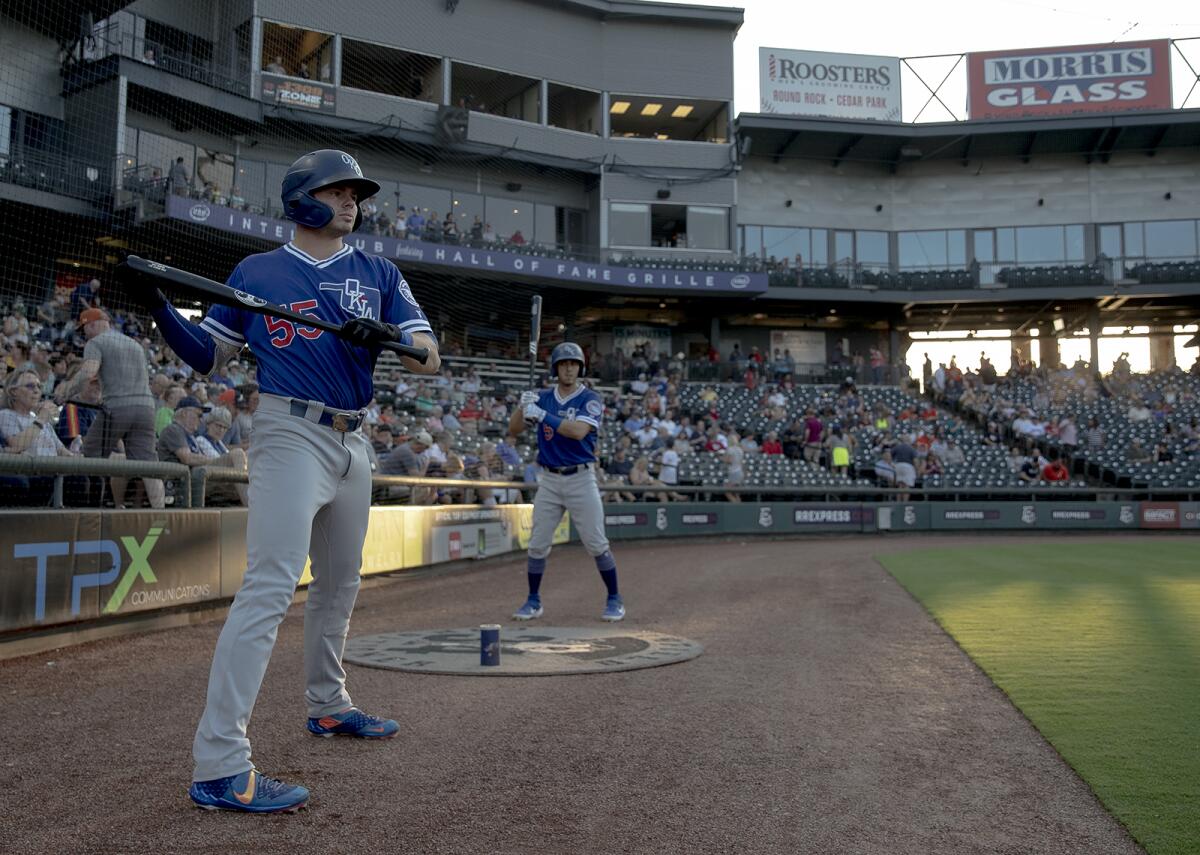
Last winter was about repetition and advancing his approach with Van Scoyoc, hitting strategist Brant Brown and assistant hitting coach Aaron Bates. He worked out alongside several Dodgers — Justin Turner, Enrique Hernandez and Joc Pederson among them — and constantly asked questions.
“It was more, ’All right, you’re facing a lefty sinker-slider guy, what’s your plan? What do you do?’ ” Lux said. “And for me that was huge because, obviously, I want to pick guys’ brains as much as I can, almost to where it was probably annoying to them. But it’s helped me a ton.”
Lux’s breakout season earned him a spot in big league camp this year. It was an opportunity to display his offensive potential. Instead, throwing problems sabotaged the spring from the first ground ball hit to him. Lux dealt with the yips before, in 2017 and 2018. But this was his worst, and most public, episode. Anxiety kicked in, magnified by his desire to impress his peers. It became a mental hurdle that grew with each miscue. The wheels turned in his head. He would baby his throws. The outcomes were occasionally embarrassing.
“He has a real maturity in the batter’s box I don’t think I’ve ever seen from someone that age.”
— Andrew Friedman, Dodgers president of baseball operations
Lux worked with skill development coordinator Shaun Larkin and other coaches on throwing drills. Physically, they focused on his staying in his legs, not standing straight before throwing to keep his arm slot. But the problem was, above all, mental.
The remedy was “letting it eat.” Translation: firing the ball without thinking about it. Lux committed two throwing errors in his first five games with Tulsa but said he was completely comfortable two weeks into the season. He’s since made 11 errors — 10 at shortstop and one at second base — in 95 games. Scouts, while mixed on whether he will stick at shortstop in the majors, report his accuracy is no longer considered a red flag.
“It was like I didn’t want to admit I had the yips, but as soon as I started talking about it and letting people know ‘Hey, there’s a little bit of a confidence thing,’ it helped a lot,” Lux said. “Ever since then, it’s been night and day.”
::
Overcoming the throwing dilemma lifted a cloud. He ripped through Tulsa, batting .313 with 13 home runs and an .896 OPS in 64 games, to earn the promotion to Oklahoma City in late June. Another leap followed. His at-bats became anticipated events. Within a couple of weeks, teams were pitching around him, nibbling the corners, willing to issue him a free pass to avoid destruction.
“It’s ridiculous,” Schmidt said. “It’s not ... supposed to be like that. For a while there, he was playing softball, man.”
Barbary compared Lux’s presence to that of Yordan Alvarez, the former Dodgers minor leaguer and American League rookie of the year favorite who clobbered Pacific Coast League pitching for two months before the Houston Astros promoted him in June. Rodriguez, now a coach for Oklahoma City, recalled that after Lux recorded a couple of more hits against the Tacoma Rainiers, Alvarez, the first baseman, rubbed him “just to get his juju or whatever.”
“Even guys in our organization,” Rodriguez said, “have been like, ‘What is going on?’ ”
“He has a real maturity in the batter’s box I don’t think I’ve ever seen from someone that age,” Dodgers president of baseball operations Andrew Friedman said. “It allows him to make in-game adjustments, and, boy, has it been really impressive.”
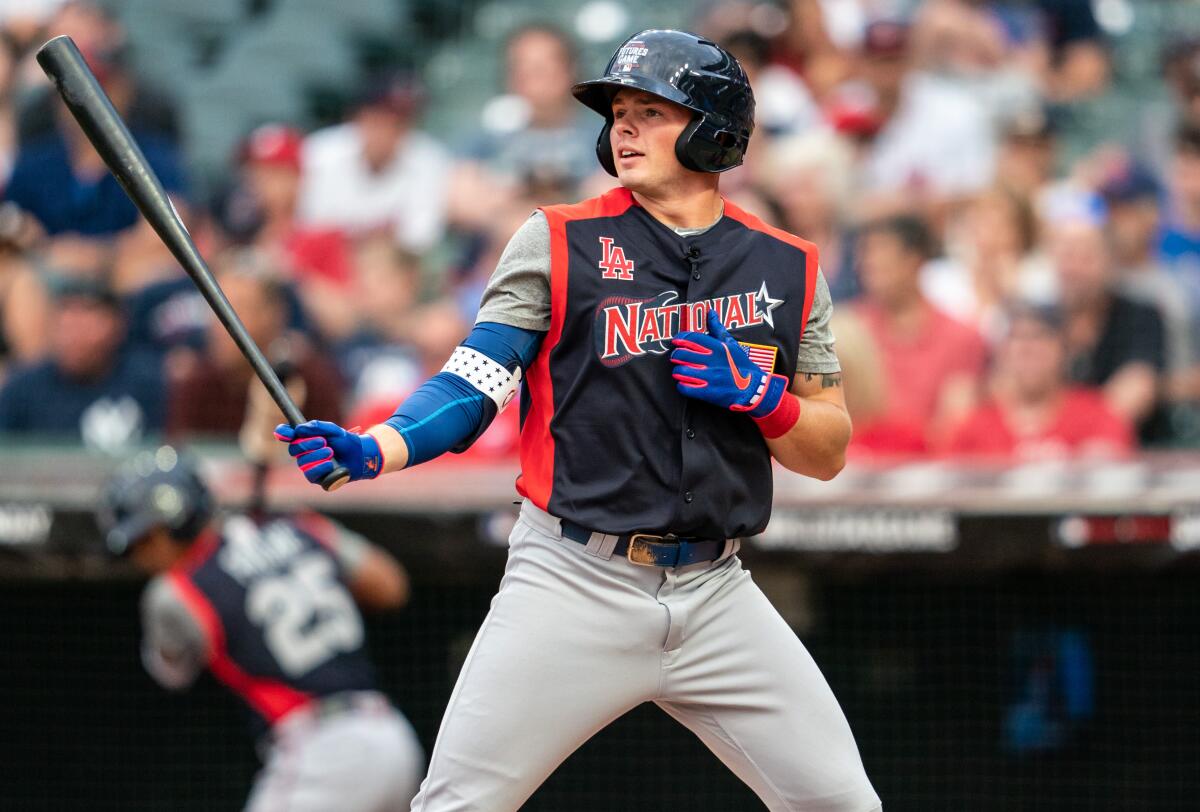
Lux has played second base more frequently in the last month. He said it was a mutual decision between him and the organization. With Corey Seager at shortstop for the foreseeable future, Lux’s immediate opportunity with the Dodgers might be at second base. Knowing that, he wanted to become better acquainted with the position and its intricacies, including the shifting the Dodgers aggressively implement.
That opportunity could come in September. Dodgers manager Dave Roberts recently said Lux likely will join the Dodgers when rosters expand in September, whether to play or observe as catcher Will Smith did last season. Meanwhile, Lux has cooled from his torrid pace. Entering Monday, he was five for 24 with eight strikeouts over his last six games. On Friday, his 50-game on-base streak ended.
“No matter what he’s faced with, he’s going to figure it out at some point,” Oklahoma City hitting coach Scott Coolbaugh said. “He’s going to fight through the adversity and he’s going to come out on top because he’s a talent and he’s conscious about the intangibles, the mental side that it takes to play at the next level.”
It had been 72 hours, an eternity by Lux’s standards, since he last recorded a hit when he took the field against the Reno Aces last Monday. Batting leadoff, he popped out on the seventh pitch of his first plate appearance. He struck out in the third inning and was the only batter not to reach base in Oklahoma City’s nine-run fifth inning. He was mired in his deepest triple-A slump. It ended there.
In the sixth, Lux exploded on a 1-2 fastball, viciously whipping his hands through the zone to demolish the pitch from Ricky Nolasco, a veteran of 12 major league seasons, for his 11th home run in 35 games. The ball landed over the berm beyond the right-field wall and bounced back into the Aces’ bullpen. It was a display of power few middle infielders at any level possess. Nolasco didn’t bother to look as No. 55, the young man the Dodgers refused to trade, rounded the bases.
“That was a bomb,” Uncle Augie said, “wasn’t it?”
More to Read
Are you a true-blue fan?
Get our Dodgers Dugout newsletter for insights, news and much more.
You may occasionally receive promotional content from the Los Angeles Times.

